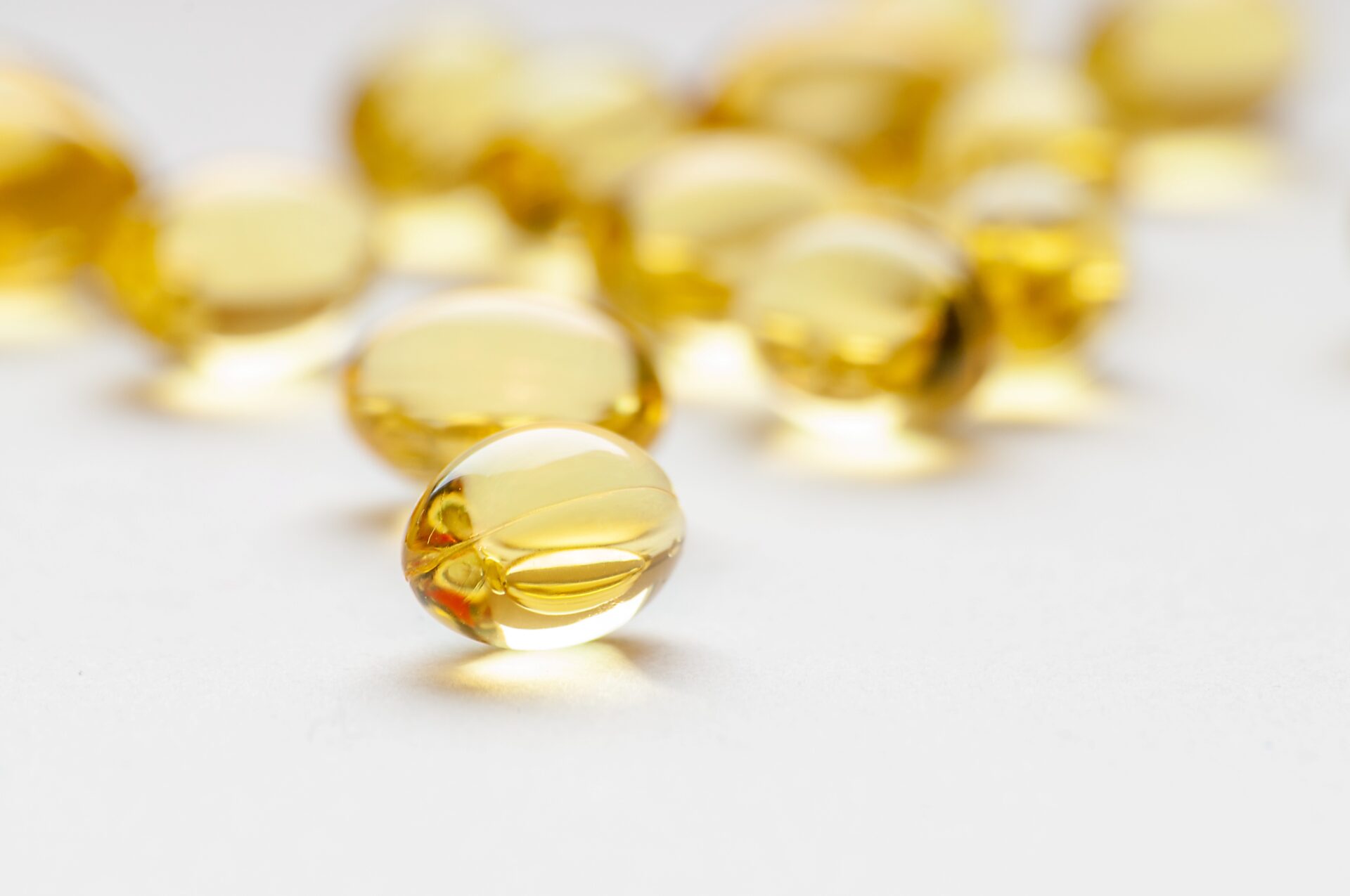Algae Oil: An Alternative Source of Essential OMEGA-3 Fatty Acids

It is now established that omega-3 fatty acids play important roles in human health and disease. These are considered essential fatty acids because they are not endogenously synthesized and must be obtained from dietary sources. Three types of Omega-3 fatty acids include long-chain alpha-linolenic acid (ALA), eicosapentaenoic acid (EPA), and docosahexaenoic acid (DHA).
Omega-3 fatty acids are involved in building cell membranes and regulating the function of the cell receptors in these membranes3. They also provide the starting point for making hormones that regulate blood clotting, contraction and relaxation of artery walls, and inflammation5. Due to these effects, they help in maintaining cardiovascular health, supporting brain function, and reducing inflammation. EPA and DHA have been known to reduce triglyceride levels, lowering blood pressure and thus support cardiovascular health whereas DHA is known to support brain health and cognitive function7. Both EPA and DHA have anti-inflammatory properties which may be beneficial in chronic inflammatory conditions, such as rheumatoid arthritis.
Sources of Omega-3 Fatty Acids
Both EPA and DHA are mainly found in marine sources, like fatty fish including anchovy, mackerel, sardines, and marine algae. ALA is found in plant-based sources, such as flaxseeds, chia seeds, hemp seeds, walnuts, and certain vegetable oils. ALA is primarily a precursor of EPA and DHA and the human body can convert ALA into EPA and DHA. However, this conversion is relatively inefficient and therefore it is still uncertain whether ALA alone can provide optimal intakes of omega-3 fatty acids.
Need for Supplementation
As the primary dietary source of these essential Omega-3 fatty acids is marine life, people who are following vegetarian or vegan diets or those who do not include enough above-mentioned sources in their diet may become deficient in these fatty acids. Omega-3 supplements can complement the dietary intake and help ensure adequate levels of Omega-3 fatty acids in this group of people.
Conventionally, fish oil has been a valuable source as raw material for omega-3 concentrates used to produce supplements. Fish oils are most commonly extracted from fatty fish such as salmon, anchovy, mackerel, and sardines. Oil composition depends on the type of fish. Studies have shown that Omega-3 fatty acids are better absorbed by humans when they are consumed in the form of triglyceride which is a natural form present in fish oils. Over the years, due to several reasons including consumption and farming for industrial purposes, global fish stock has been depleting. Another growing concern is around the rapidly depleting fish population, and therefore the sustainability issues. Due to these concerns, alternative sources of omega-3 fatty acids are being explored.

Marine Microalgae as a Source of Omega-3
Marine microalgae are primary producers of DHA and EPA. They are a potentially valuable and sustainable source of omega-3 fatty acids due to their ability to grow rapidly on a non aerable land. Microalgae are known to produce about several times more oil than terrestrial oleaginous plants4. Additional advantages of microalgae oil are, lack of fishy taste or risk of fish allergy, their ability to withstand a variety of culture conditions thereby reducing carbon dioxide emission. Microalgae oil is also free from contaminants and cholesterol that are found in fish oils. Thus, microalgae oils can be produced on a large scale without significant environmental impact and therefore, are a sustainable alternative source to fish oil. However, production of quality algae oil on a larger scale can be challenging. From selection of appropriate algal strains (non-toxic, non-pathogenic), generating optimum culture conditions, high biomass production, to achieving optimum omega-3 acids proportions, it is important to maintain a fine balance of processing conditions2.
VivoMega Algae 0070 TGP and 0040TGP from GC Rieber is a high-quality ocean derived, vegan Omega-3 from microalgae, species Schizochytrium spp. Produced by GC Rieber’s proprietary SuperLight process. This process is designed specifically for algae oils that leverages proprietary refining, concentration, distillation and deodorization technologies and processes, and ensures a production process which is highly controlled with minimum exposure to heat and superior oxidation protection. High in DHA, VivoMega algae concentrate is >90% triglycerides which is the natural fat found in fish and mammals and has superior absorption in the human body.
To learn more about VivoMega Algae 0040TG, 0070 TGP and other Omega-3 products available from GC Rieber, please explore our product portfolio.
Explore Our Omega-3 Portfolio

Dr. Nilesh Patankar, Head of Formulation & Innovation
Currently working at Quadra as Head of Formulation and Innovation. This is an industry liaison role through which Nilesh provides the required scientific, technical expertise and support to Quadra’s customers and suppliers. Before joining Quadra, Nilesh obtained a PhD in Pharmaceutical Sciences from University of British Columbia, Canada and have worked in the Pharmaceutical R&D and product development for over twelve years. Nilesh’s expertise includes end-to-end product development, scale-up and technology transfer for a variety of dosage forms. Nilesh possesses extensive knowledge of ingredients and their functionality in the finished products. Nilesh has six research articles published in high impact international journals with over one hundred citations.
References:
-
Bradberry J.C.; and Hilleman D. E.. Overview of Omega-3 Fatty Acid Therapies. P&T®; Vol.38; No.11; (November 2013); 681 – 691.
-
Rubio-Rodríguez N., Beltrán S., Jaime I., Sara M. de Diego, Sanz M. T., Carballido J. R.. Production of omega-3 polyunsaturated fatty acid concentrates: A review. Innovative Food Science and Emerging Technologies; 11; (2010); 1–12
-
Ruxton, C. H. S., Calder, P. C., Reed, S. C., & Simpson, M. J. A. (2005). The impact of longchain n−3 polyunsaturated fatty acids on human health. Nutrition Research Reviews; 18; 113−129
-
Bayu A. P. , Zulkarnain C., Arif J. K., Abdi D., Indra J. Z., Syafrizayanti, A. B., Masteria Y. P., Omega-3 fatty acids of microalgae as a food supplement: A review of exogenous factors for production enhancement. Algal Research Vol. 60; (December 2021); 102542.
-
Surette ME. The science behind dietary omega-3 fatty acids. Can Med Assoc J; 178 (2008); 177–180.
-
Tur JA, Bibiloni MM, Sureda A, Pons A. Dietary sources of omega 3 fatty acids: Public health risks and benefits. Br J Nutr; 107(Suppl 2); (2012); S23–S52.
-
Delgado-Lista J, Perez-Martinez P, Lopez-Miranda J, Perez-Jimenez F. Long chain omega-3 fatty acids and cardiovascular disease:A systematic review. Br J Nutr 2012;107(Suppl 2):S201–S213




